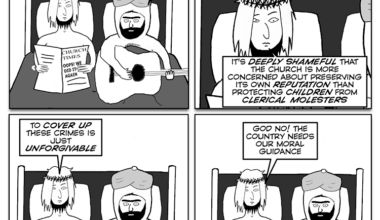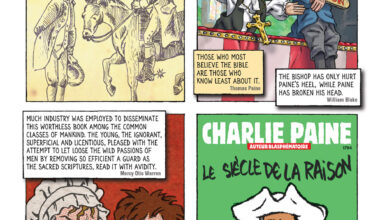
Vladimir Putin is one of the last defenders of Christian civilisation from an onslaught of wokeness taking over the West. The liberal democratic world is in danger of collapsing if it doesn’t return to its Judeo-Christian roots. The rise of secularism in the United States and Europe has created a spiritual and moral vacuum which is being crammed with conspiracism, political extremism, and identity politics.
These are a few of the ideas you’ll encounter if you spend some time listening to the New Theists. While the term ‘New Theism’ has been used before, the journalist Ed West provided a useful definition in a December 2023 article in The Spectator: ‘Their [the New Theists’] argument is not that religion is true, but that it is useful, and that Christianity has made the West unusually successful.’ While the extent to which the New Theists regard religion as true varies from person to person, West’s definition captures the general thrust of the movement.
The conservative public intellectual and self-help guru Jordan Peterson is the Richard Dawkins of New Theism. Peterson has spent many years defending religious narratives as integral to human understanding and flourishing, and he believes a recommitment to these narratives is indispensable for the survival of Western civilisation. He also believes that Western civilisation is a product of Judeo-Christian values and institutions—despite the long history of secular resistance to religious dogma and tyranny in the West.
In a recent conversation with the philosopher Daniel Dennett, Peterson described religion as the ‘enterprise that specifies the highest aim, or the most foundational of aims’. If you ask Peterson to define words like ‘religion’, ‘god’, or ‘divine’, you’ll get labyrinthine, metaphor-laden monologues about hierarchies of values, the logos, consciousness across time, something called the ‘transcendental repository of reputation’, and so on to a boundless extent.
Meanwhile, Peterson won’t answer straightforward questions about his attitude toward the metaphysical claims of Christianity. During a 2018 debate, Susan Blackmore asked Peterson if he believed Jesus was divine: ‘Did he do miracles?’ He responded: ‘How about this? “Render unto Caesar what is Caesar’s and unto God what is God’s.” That’s a miracle.’ The host didn’t allow Blackmore a natural follow-up, like: ‘Sure, but did he rise from the dead?’
Peterson isn’t the only New Theist who shies away from explicit affirmations of his theological beliefs—particularly beliefs which require faith in any supernatural phenomena. In November last year, Ayaan Hirsi Ali published an essay about her conversion to Christianity, in which the name ‘Jesus’ appears nowhere.

Hirsi Ali described her atheism as a reaction to the horrors of fundamentalist Islam—particularly the September 11 attacks, but also her vivid memories of religious stupidity and persecution, which she has bravely confronted all her life. She said her discovery of Bertrand Russell’s 1927 lecture ‘Why I am Not a Christian’ was a great relief which offered a ‘simple, zero-cost escape from an unbearable life of self-denial and harassment of other people.’ She discussed her contempt for the refusal among many Western ‘politicians, scholars, journalists, and other experts’ to acknowledge the theological motivations of the perpetrators on September 11. She said she enjoyed spending time with ‘clever’ and ‘fun’ New Atheists like Dawkins and Christopher Hitchens.
But Hirsi Ali now calls herself a Christian for purely instrumental reasons—she believes that ‘Western civilisation is under threat’ from the aggressive authoritarianism of China and Russia, radical Islam, and the ‘viral spread of woke ideology’. She laments the ineffectiveness of ‘modern, secular tools’ at countering these threats: ‘We are either running out of money, with our national debt in the tens of trillions of dollars, or we are losing our lead in the technological race with China.’ She continues: ‘The only credible answer, I believe, lies in our desire to uphold the legacy of the Judeo-Christian tradition.’
Hirsi Ali made three main points: Western civilisation is ‘built on the Judeo-Christian tradition’, the only way to defend liberal values is through a recommitment to this tradition, and atheism ‘failed to answer a simple question: what is the meaning and purpose of life?’ These are the central arguments made by many other New Theists.
Hirsi Ali spent many years as an atheist, so it’s surprising that she attributes the development of ‘freedom of conscience and speech’ in the West solely to Christianity. She says nothing about the secular humanism developed by Enlightenment thinkers like Voltaire and David Hume. She doesn’t mention Thomas Paine’s great attack on Christianity, The Age of Reason. She skips over Thomas Jefferson’s Virginia Statute for Religious Freedom, the document which laid the foundation for the First Amendment and erected what Jefferson described as the ‘wall of separation between church and state’ in the United States.
Many of the most important advancements for free speech and conscience in the West were made despite furious religious opposition. The Enlightenment was in part a response to centuries of religious bloodletting in Europe, which is why criticism of religious authority was such an integral part of its development. The reason Peterson celebrates Christ’s injunction to ‘Render unto Caesar what is Caesar’s and unto God what is God’s’ is that this line provides Biblical authority for the separation of church and state. But it still took centuries of moral and political progress—almost always in conflict with religious power—to institutionalise that separation.
According to Hirsi Ali, Peterson, and other New Theists (such as the historian Tom Holland), the liberal principles and institutions of the West—democracy, free expression, individual rights, and so on—are all ultimately attributable to Christianity. As Holland puts it, ‘We are goldfish swimming in Christian waters.’ Hirsi Ali says that Christianity is the ‘story of the West’. Peterson describes the Enlightenment as ‘irreducibly embedded inside this underlying structure’ of the Judeo-Christian tradition.
But what does a recommitment to this tradition look like in practice? Beyond their selective history which leaves out the centuries of political and philosophical struggle against religious dominion, the New Theists don’t have much to offer in the way of solutions to what they view as a spiritual and political crisis in the West today.
Hirsi Ali recommends Christianity as a source of social solidarity, as it will fill the ‘void left by the retreat of the church’ with the ‘power of a unifying story’. She doesn’t explain how this will better equip the West to confront China or Russia, and she doesn’t seem to care that the ‘unifying story’ doesn’t apply to the 37 per cent of Americans (and much larger proportions in many European countries) who aren’t Christians.
Hirsi Ali believes religion has been replaced by a ‘jumble of irrational quasi-religious dogma’, such as the ‘modern cult’ of wokeness. This is a common claim. West says that the ‘collapse of American Christianity gave rise to a new intolerance towards anybody who diverged from progressive opinion.’ In his 2019 book The Madness of Crowds: Gender, Race and Identity, the conservative commentator Douglas Murray argues that Christianity has been replaced by a ‘new religion’ of strident identitarian activism.
There are several problems with this narrative. First, the process of secularisation has been going on for decades, while many movements the New Theists decry as ‘woke’ have emerged more recently. Second, Christianity has historically been compatible with a vast range of political and social movements. Many Nazis were Christians, as were many liberators of the concentration camps. Christianity has been used to justify slavery for millennia, but it was also invoked by civil rights leaders like Martin Luther King, Jr. (with crucial support from secularists like Bayard Rustin and A. Philip Randolph).
Many politicians and intellectuals who present themselves as defenders of the Christian West don’t have an inspiring record on Ukraine.
According to Hirsi Ali, ‘We can’t withstand China, Russia and Iran if we can’t explain to our populations why it matters that we do.’ But we don’t need Christianity to explain why resisting theocracy, imperialism, and totalitarianism matters. Take Russia’s invasion of Ukraine, for instance. The West—even in its secularised and allegedly degenerate state—shocked Putin by rallying to Ukraine’s defence when his forces attempted to abolish its existence as an independent state. Ukraine’s desire to join the Western system of economic and political organisation was the trigger for the war, and solidarity with a fellow democracy under siege was sufficient to convince Ukraine’s Western allies that they had a responsibility to help.
Many politicians and intellectuals who present themselves as defenders of the Christian West don’t have an inspiring record on Ukraine. Viktor Orbán has cultivated an image of himself as the leader of a ‘Christian government’ which is defending traditional Christian values against sinister, godless globalists. He also wants to abandon Ukraine. He recently declared that Donald Trump ‘will not give a penny in the Ukraine-Russia war. That is why the war will end’, and he regards Trump as the ‘man who can save the Western world.’
Trump wants to pull the United States out of NATO and he says the Russians should be able to ‘do whatever the hell they want’ to American allies that haven’t made sufficient investments in their militaries. The overwhelming majority of white evangelical Protestants supported Trump, and this support has held despite his attempt to overthrow the 2020 election. These American Christians aren’t just indifferent about the fate of Ukrainian democracy—they’re willing to put their own democracy in peril to bring their favourite demagogue back into the Oval Office. Is this what the defence of Western civilisation looks like?
Hirsi Ali’s fellow New Theist Jordan Peterson sneers at Western solidarity with Ukrainian democracy as ‘shallow moral posturing’ and a ‘banal form of dimwit flag-waving.’ Peterson has long been opposed to Western support for Ukraine, and he blames the invasion on ‘NATO and EU expansionism’ (a standard argument for Putin’s apologists like the ‘realist’ academic John Mearsheimer, whom Peterson has consulted with).
In an essay published several months after the invasion of Ukraine, Peterson argued that the conflict is a ‘civil war’ within the West. He believes liberal democracies like the United States have become increasingly degenerate and spiritually bankrupt, and he’s impressed with how Putin presents Russia as a ‘bulwark against the moral decadence of the West.’
Putin has increasingly cloaked his authoritarianism and imperialism in the garb of the Russian Orthodox Church, but instead of recognising the grotesque cynicism of this ploy, Peterson says he feels reassured by these professions of faith. He also suspects that Putin is on the right side of the global culture war: ‘Are we degenerate, in a profoundly threatening manner? I think the answer to that may well be yes.’ Peterson believes Putin decided to ‘invade and potentially incapacitate Ukraine’ to keep the ‘pathological West out of that country’, and his recommended course of action is total surrender.
The New Theists…use religion as a crutch and cudgel—they have a ‘god-shaped hole’ in their lives and assume that the only way to find any real meaning or purpose in life is to fill it with Christian dogma.
Peterson is the most influential New Theist in the world, and he’s sympathetic to the cultural grievances of a brutal dictator who started the most devastating conflict in Europe since World War II. He believes the ‘pathological West’ should submit to the whims of that dictator and abandon his victims—people who are risking and losing their lives to uphold the values and institutions of the West every day. Hirsi Ali isn’t just wrong when she says that belief in Christianity is necessary to defend Western civilisation from its most dangerous foes—she fails to see how belief can actually be a severe impediment in that fight.
The New Theists aren’t the guardians of Western civilisation they purport to be. They use religion as a crutch and cudgel—they have a ‘god-shaped hole’ in their lives and assume that the only way to find any real meaning or purpose in life is to fill it with Christian dogma. Then they insist that this spiritual problem is universal—and tell us that they alone have the solution. That’s the thing about New Theism—it doesn’t take long to realise that there’s nothing new about it.
Further reading on New Atheism and New Theism
The case of Richard Dawkins: cultural affiliation with a religious community does not contradict atheism, by Kunwar Khuldune Shahid
Do we need God to defend civilisation? by Adam Wakeling
What has Christianity to do with Western values? by Nick Cohen
What I believe: Interview with Andrew Copson, by Emma Park
Against the ‘New Theism’, by Daniel James Sharp
How three media revolutions transformed the history of atheism, by Nathan Alexander
Atheism, secularism, humanism, by Anthony Grayling
‘An animal is a description of ancient worlds’: interview with Richard Dawkins, by Emma Park
‘Nature is super enough, thank you very much!’: interview with Frank Turner, by Daniel James Sharp
Consciousness, free will and meaning in a Darwinian universe: interview with Daniel C. Dennett, by Daniel James Sharp
Christopher Hitchens and the long afterlife of Thomas Paine, by Daniel James Sharp
‘The Greek mind was something special’: interview with Charles Freeman, by Daniel James Sharp
‘We are at a threshold right now’: interview with Lawrence Krauss on science, atheism, religion, and the crisis of ‘wokeism’ in science, by Daniel James Sharp








1 comment
What exactly are the “Christian values” that made America great? Aside from accepting laughable and impossible to believe supernatural fantasies? “Turning the other cheek” – the meekness, resentment, and cowardice that Nietzsche blamed on Christianity – is one such value actually at the root of our current difficulties. The wimpyness of American foreign policy – the lack of establishing and maintaining a robust deterrence against the malefactors of the world – is 90% of the problem. It’s how the cold war was won and lack of it led to the Ukraine invasions (the first came during the Obama years) and fears for Taiwan. It’s why Iran and Islamic values cause so much trouble in the Middle East.
Your email address will not be published. Comments are subject to our Community Guidelines. Required fields are marked *
Donate